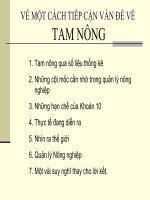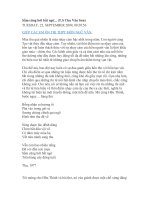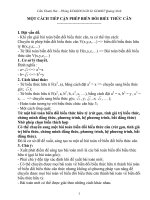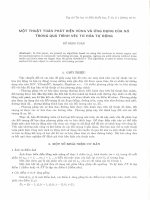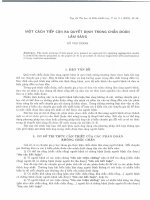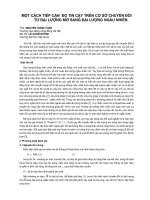Grammar focus
Bạn đang xem bản rút gọn của tài liệu. Xem và tải ngay bản đầy đủ của tài liệu tại đây (936.09 KB, 65 trang )
Grammar Focus
50 essential grammar rules
By Helen Mathur
Buyer: Leigh Barrington ()
Transaction ID: 73K31838P6806125J
- 2 -
© Helen Mathur 2010.
All rights reserved. No part of this book may be reproduced, stored in a retrieval system, or
transmitted in any form or by any means, without the prior written permission of the author,
except in the case of brief quotations employed in critical articles or reviews.
The author has made every effort to ensure the accuracy of the information herein. However,
the information contained in this book is sold without warranty, either express or implied.
Neither the author, nor its dealers or distributors, will be held liable for any damages caused
either directly or indirectly by the instructions contained in this book.
Test names and other trademarks are the property of the respective trademark holders. None
of the trademark holders are affiliated with, or endorse, this product.
Version 1.1
Buyer: Leigh Barrington ()
Transaction ID: 73K31838P6806125J
- 3 -
Introduction
Grammar Focus is a systematic approach to learning important rules for standardized tests of
English. These fifty rules are essential knowledge for multiple-choice sentence correction,
identification of sentence errors and editing in context questions that occur on tests such as
GMAT, SAT and ACT.
The rules are grouped into eight sets covering the major areas that feature in tests of English
usage. You can study the groups in any order. Print out one set at a time for effective learning.
Each rule is on a separate page. We suggest you study the sample sentences and explanations
first. Then check how much you have learned by doing the additional sentences at the bottom
of each page.
If your knowledge of basic grammar terms is weak, you can refer to parts of speech in the
‘Extras’ section.
Once you have studied the rules, try out the grammar tests on www.majortests.com. You will
find these tests in both GMAT and SAT areas of the site.
Where relevant, the explanations to the questions on www.majortests.com indicate which
rule applies. You will need to revise the rules several times during your test preparation.
Buyer: Leigh Barrington ()
Transaction ID: 73K31838P6806125J
- 4 -
Contents
Pronouns .................................................................................................................... 6
[A01] Compound subjects ................................................................................................ 6
[A02] Compound objects .................................................................................................. 7
[A03] Pronoun predicates .................................................................................................8
[A04] Pronouns in apposition ........................................................................................... 9
[A05] Pronoun-noun pairs............................................................................................... 10
[A06] Pronouns in comparisons ...................................................................................... 11
[A07] Pronouns after prepositions ................................................................................... 12
[A08] Who and whom..................................................................................................... 13
[A09] Pronouns and gerunds .......................................................................................... 14
[A10] Possessive pronouns and adjectives ....................................................................... 15
Verb agreement ........................................................................................................ 16
[B01] Verb-subject agreement ........................................................................................ 16
[B02] Compound subjects linked by ‘and’ ........................................................................ 17
[B03] Subject placed after the verb ................................................................................. 18
[B04] Either and neither ................................................................................................. 19
[B05] Neither…nor and either…or ................................................................................... 20
[B06] Singular indefinite pronouns .................................................................................. 21
[B07] Latin and Greek plurals .......................................................................................... 22
[B08] Collective nouns .................................................................................................... 23
[B09] A number of / the number of .................................................................................. 24
Verb tense, voice and mood ....................................................................................... 25
[C01] Past perfect tense ................................................................................................. 25
[C02] Present perfect tense ............................................................................................ 26
[C03] Future perfect tense .............................................................................................. 27
[C04] General statements in the present tense ................................................................ 28
[C05] Future and conditional tenses ................................................................................ 29
[C06] ‘If’ constructions .................................................................................................... 30
[C07] The passive voice ................................................................................................... 31
[C08] The subjunctive in impossible / very unlikely situations ........................................... 32
[C09] The subjunctive in indirect commands ................................................................... 33
Buyer: Leigh Barrington ()
Transaction ID: 73K31838P6806125J
- 5 -
Parallelism................................................................................................................ 34
[D01] Lists...................................................................................................................... 34
[D02] Paired conjunctions .............................................................................................. 35
[D03] Verb tense and voice continuity ............................................................................. 36
[D04] Pronoun continuity ............................................................................................... 37
Dangling modifiers and misplaced parts ..................................................................... 38
[E01] Misplaced words .................................................................................................... 38
[E02] Misplaced parts ..................................................................................................... 39
[E03] Dangling modifiers ................................................................................................ 40
Idiom and diction ...................................................................................................... 41
[F01] Idiom .................................................................................................................... 41
[F02] Diction .................................................................................................................. 42
Punctuation .............................................................................................................. 43
[G01] The semicolon ...................................................................................................... 43
[G02] The apostrophe .................................................................................................... 44
[G03] The colon .............................................................................................................. 45
Miscellaneous ........................................................................................................... 46
[H01] Which and that ..................................................................................................... 46
[H02] Among / between and one another / each other ..................................................... 47
[H03] Comparative and superlative ................................................................................. 48
[H04] Less/fewer and amount/number ............................................................................ 49
[H05] Other and else ...................................................................................................... 50
[H06] Hopefully.............................................................................................................. 51
[H07] Like ...................................................................................................................... 52
[H08] Comparisons ........................................................................................................ 53
[H09] Hardly and scarcely ............................................................................................... 54
[H10] Ellipsis .................................................................................................................. 55
Extras ...................................................................................................................... 56
Parts of Speech .............................................................................................................. 56
Top 20 irregular verbs ..................................................................................................... 58
Top 20 idioms ................................................................................................................ 59
Top 25 diction errors ...................................................................................................... 62
Buyer: Leigh Barrington ()
Transaction ID: 73K31838P6806125J
- 6 -
Pronouns
Compound subjects
My sister, my brother and me invited them to the party.
My sister, my brother and I invited them to the party.
Explanation
A compound subject is two or more subjects joined by and. All of the parts of the subject must
be in the subjective case.
There is no difference in the subjective case and objective case for nouns, but if the subject of
a sentence is a pronoun (or includes a pronoun) you need the correct form. For example, we
invited is fine, but us invited is obviously wrong. (See list of subject pronouns below.)
Generally the subject of a verb does the action. You can usually find the subject by putting the
question words who or what before the verb. In the case above you would ask, Who invited?
In the example above, My sister, my brother and I forms the subject of the verb invited. Hence
the pronoun must be I not me.
Subject pronouns are: I, you, he, she, it, we, they, who
More Examples
The two supervisors, Julia and me / I will interview the candidates tomorrow.
(I is correct – read as: I will interview)
He / him and his family are looking for a new home.
(He is correct. Read: He is looking for a new home.)
Ask whether, after all our hard work, Suzie and I / me are adequately prepared for the
competition.
(I am prepared. In this case you need to alter the form of the verb to check the sentence.)
A
01
Note: You can check this type of sentence by testing the pronoun on its own: ‘.....I invited
them to the party,’ is obviously correct.
Buyer: Leigh Barrington ()
Transaction ID: 73K31838P6806125J
- 7 -
Pronouns
Compound objects
The article cited Brown and she as the best examples.
The article cited Brown and her as the best examples.
Explanation
A compound object is two or more objects joined by and.
All of the parts of the object must be in the object case. Brown and her forms the object of the
verb cited.
Generally the object of a verb has the action done to it. You can usually find the object by
putting the question words whom or what after the verb. In the case above you would ask
Cited whom? (The answer is the object: Brown and her.) There is no difference in the
subjective case and objective case for nouns. But if the object of a sentence is a pronoun you
need the object form. Cited them is fine, but cited they is obviously wrong.
Object pronouns are: me, you, him, her, it, us, them, whom
More Examples
It is difficult to see how the rule will affect you and I / me.
(Me is correct. Read as: the rule will affect me.)
My parents said that my sister had taken both my brother and they / them to the new
restaurant.
(Them is correct. Read as: taken them.)
Joe complained that the journalist interviewed the witnesses and he / him, but not the
police officer.
(Interviewed him)
A
02
Note: You can check this type of sentence by testing the pronoun on its own: The article
cited her, is obviously correct.
Buyer: Leigh Barrington ()
Transaction ID: 73K31838P6806125J
- 8 -
Pronouns
Pronoun predicates
It was me who knocked on the door.
It was I who knocked on the door.
Explanation
What follows a form of the verb to be is called the predicate (not the object). This is a technical
matter that need not concern us except that we need to know that we shouldn’t put the
object form of a pronoun after this verb. In practice this means that the verb to be has the
same case before as after.
The verb to be can be used as a verb in its own right (he was old; she will be there etc.) but it is
also used as an auxiliary verb. An auxiliary verb is a verb used to ‘help’ another verb form
different tenses. For example, the verb to play can form simple tenses on its own: I play; he
played etc, but uses to be to form other tenses: I am playing; he will be playing etc.
Be careful that you check your pronouns with the full verb not just the auxiliary. For example, I
was calling my sister and him. (Him is part of the object of the verb was calling.) Or, It was my
sister and he that I called. (He is part of the predicate after was.)
Common forms of the verb ‘to be’ include: am, is, are, was, were, will be
More Examples
The winners will be they / them who produce the most elegant answers.
(They will be the winners.)
Few agree with my selection but I still think it should be she / her.
(She should be it.)
They were expecting my brother, but when I entered they thought I was he / him.
(He was I.)
A
03
Note: Since to be has the same case after as before, try switching the parts to check for
reversibility. It was I = I was it. (Obviously it can’t be ‘it was me’ because the reverse ‘me
was it’ is incorrect.)
Buyer: Leigh Barrington ()
Transaction ID: 73K31838P6806125J
- 9 -
Pronouns
Pronouns in apposition
The club accepted two new members, Ajay and I.
The club accepted two new members, Ajay and me.
Explanation
A word or phrase in apposition is placed next to another word or phrase in order to rename it.
The appositive is set off from the rest of the sentence by commas. A pronoun in apposition is
always in the same case (subject or object) as the noun or pronoun to which it refers. The ‘two
members’ are the object of the verb accepted and so we need the object form in the
appositive.
More Examples
The winners, Tom and he / him, displayed the trophy to the audience.
(He displayed the trophy.)
Let’s you and I / me send a thank you note to her.
(First note that let’s is short for let us. Then replace us with the disputed pronoun. Let me
send a note.)
When we worked at the shop the owner decided to send the two of us, Anita and I / me,
on a training course.
(Send me.)
A
04
Note: Put the pronoun in the sentence in place of what it renames, and then check for
sound effect. (The club accepted I is clearly incorrect.)
Buyer: Leigh Barrington ()
Transaction ID: 73K31838P6806125J
- 10 -
Pronouns
Pronoun-noun pairs
It was us novices who had difficulty with the task.
It was we novices who had difficulty with the task.
Explanation
In the case of expressions such as we students and us examiners, always ignore the noun
when checking the pronoun. In this case, it was we is correct because the verb to be does not
take an objective case. [See rule A03]
More Examples
We / us winners displayed the trophy to the audience.
(We displayed the trophy.)
The layman cannot appreciate the thrill we / us entomologists experience on discovering a
new beetle.
(We experience….)
He failed to convince we / us students that he had graded our work fairly.
(Convince us….)
A
05
Note: Put the pronoun in the sentence without its partner noun. (It was us is incorrect.)
Buyer: Leigh Barrington ()
Transaction ID: 73K31838P6806125J
- 11 -
Pronouns
Pronouns in comparisons
He works harder than her.
He works harder than she.
Explanation
A pronoun following the prepositions than and as should be in the subjective case. In ordinary
speech we say, ‘I am taller than him’ or, ‘I run as fast as him’. Or at least most of us do.
However, for our present purposes this is incorrect. The reason is that we are supposed to
complete the comparison (mentally, that is). So we have:
He works harder than she (does).
I am taller than he (is).
But we leave out the last verb.
More Examples
Now that they have won the lottery, they are as rich as we / us.
(They are as rich as we (are).)
They received the news later than she / her.
(They received the news later than she (did).)
Juan is as tall as Susan, she is younger than he / him.
(She is younger than he (is).)
A
06
Note: Try to add a verb to complete the comparison. For example, I can work as hard as he
(can).
Buyer: Leigh Barrington ()
Transaction ID: 73K31838P6806125J
- 12 -
Pronouns
Pronouns after prepositions
Mother told father about Tom and I.
Mother told father about Tom and me.
Explanation
Pronouns that follow prepositions (such as by, for, from, to, with, except, against etc.) are in
the objective case [See rule A02]. About me is correct, but about I is incorrect.
The exception to the rule is than and as in comparisons [See rule A06]
Also watch out for who and whom which could be in the subject form even after to depending
on what follows [See rule A08]
More Examples
Everyone except he / him was well prepared for the test.
(Except is a preposition and should be followed by the object case: him.)
They received the news from the neighbor before they heard from my girlfriend and I /
me.
(From is a preposition and needs the object case: me. Note the compound object here
[See rule A02])
I gave the new book to a friend who promised to deliver it to we / us eager readers.
(To is a preposition and requires the object case: us. Note the pronoun-noun pair [See rule
A05])
A
07
Note: Always check pronouns first on tests. Get used to looking for pronouns in any
grammar question.
Buyer: Leigh Barrington ()
Transaction ID: 73K31838P6806125J
- 13 -
Pronouns
Who and whom
They will give the award to whomever deserves it.
They will give the award to whoever deserves it.
Explanation
Who and whoever are subject forms and whom and whomever are object forms.
These ‘annoying’ pronouns need to be tested in the clause to which they apply.
A useful rule is to ignore all the words in the sentence up to who / whom and then consider
only the next part of the sentence, rewording if needed. Test out the case required by
substituting he / him or she / her (or they / them). For example:
They will give the award to whoever / whomever deserves it.
Cut the first part to leave: whoever / whomever deserves it.
Replace who / whom with he / him or she / her: she deserves it.
Since she deserves it sounds better than her, a subject is required, and whoever is
correct.
[See rules A01 and A02 for lists of subjects and objects]
More Examples
We did not know who / whom would be able to repair the hard drive.
(Who. Cut the first part; change to he/him –‘ he would be able..’ Hence we need a subject.)
They will take the money from whoever / whomever they think most able to afford it.
(Whoever. Do not choose whomever just because it follows the preposition from! The
whole clause ‘whoever…..amount’ is the object of from. Always test who in its own clause.
Remove the parenthetical expression they think. Now we have he is most able to afford.)
The lawyer who / whom you chose to represent you is doing an excellent job.
(Cut, replace, rearrange…to get: you chose her. Her is an object and so whom is correct.)
A
08
Note: Remove parenthetical expression (I think, we believe, it is said etc.) before testing
who and whom.
Buyer: Leigh Barrington ()
Transaction ID: 73K31838P6806125J
- 14 -
Pronouns
Pronouns and gerunds
I was annoyed by him singing.
I was annoyed by his singing.
Explanation
A pronoun DIRECTLY in front of a gerund should be in the possessive form. A gerund is a
present participle used as a noun. Or in simpler terms, a gerund is an ‘ing’ word, such as
cooking, singing, and eating.
The reasoning in the example above goes like this: I am not annoyed by him. It is the singing
that annoys me. I am specifying that it is his singing in particular that annoys me.
Note: If other words intervene between pronoun and gerund, do not use the possessive.
Possessive forms include: my, your, his, her, its, our, their
More Examples
She took me / my cooking her dinner for granted.
(Cooking is a gerund and so the possessive form is correct: my.)
I don’t object to them / their leaving the meeting early.
(Their is a possessive form and is needed because leaving is a gerund. Note that we
shouldn’t be tempted to put them to follow the preposition to, because the expression
their leaving forms the object and not the pronoun alone.)
Organic gardeners object to us / our using chemical pesticides.
(Gardeners do not object to us. They object to our using.)
A
09
Note: If there is a noun in front of a gerund, that noun will need to be in the possessive
form. For example, There is no objection to the girl’s going for the interview.
Buyer: Leigh Barrington ()
Transaction ID: 73K31838P6806125J
- 15 -
Pronouns
Possessive pronouns and adjectives
The dog wagged it’s tail.
The dog wagged its tail.
Explanation
None of the possessive forms of pronouns have apostrophes. Only nouns use apostrophes to
form possessives.
The form it’s is a shortened form of it is. Similarly who’s is a shortened form of who is.
Possessive pronouns include: mine, yours, his, hers, ours, theirs
Possessive adjectives include: my, your, his, her, our, their
More Examples
Its / it’s my birthday today.
(Full form: It is my birthday and so it’s is correct.)
The disc player they sold on eBay is ours / ours’ and not theirs / their’s / theirs’.
(Since no possessive form of a pronoun requires an apostrophe it is obvious that ours and
theirs are correct. The other forms can NEVER be correct.)
Whose / who’s party will you attend? Hers / her’s or mine?
(Since we do not mean who is we must choose whose party. Hers is correct because the
other version is NEVER correct.)
A
10
Note: Possessive forms are mainly tested in connection with the gerund rule [See rule
A09]. For full information on the apostrophe see rule G02.
Buyer: Leigh Barrington ()
Transaction ID: 73K31838P6806125J
- 16 -
Verb agreement
Verb-subject agreement
The murmur of bees buzzing around the grassy meadows sound
delightful.
The murmur of bees buzzing around the grassy meadows sounds
delightful.
Explanation
Every sentence has a verb that agrees in number with its subject. Thus we say, ‘The gardener
digs’ but, ‘The gardeners dig’. This is a speech pattern that we don’t need to analyze; it just
comes naturally. We only get confused if, for some reason, we fail to match up the verb with
the correct subject. Insertion of long phrases between the subject and verb can lead to
confusion. In this case The murmur is the subject and requires a singular verb: sounds.
Common phrases that need to be ignored when finding the subject include those beginning
with:
with as well as
along with in addition to
together with accompanied by
More Examples
The cardamom, along with the cinnamon and apple, give / gives the dish its unusual
flavor.
(The cardamom gives the dish its flavor. Ignore the ‘along with’ phrase!)
In today’s newspaper the case of the missing child as well as the recent murders of
policemen is / are discussed in the editorial.
(The case is discussed. Ignore the ‘as well as’ phrase.)
The number of students taking standardized tests increase / increases every year.
(The number increases. Ignore the prepositional phrase!)
B
01
Note: Generally a phrase starting with a preposition (of, by, for, with etc.) is not the subject
of the verb. (So ignore these phrases when checking agreement.)
Buyer: Leigh Barrington ()
Transaction ID: 73K31838P6806125J
- 17 -
Verb agreement
Compound subjects linked by ‘and’
The television set and the washing machine was damaged by the
short circuit.
The television set and the washing machine were damaged by
the short circuit.
Explanation
Two singular subjects joined by and must have a plural verb. This can sound strange: A crow
and a pigeon are sitting on the fence. One crow and one pigeon make two birds and require a
plural verb.
More Examples
A diamond necklace and an emerald ring was / were stolen from the hotel safe.
(A necklace and a ring are two items and so were stolen is correct.)
Interviews with prominent activists and a letter from the Prime Minister form / forms the
core of the objections to the plan.
(Interviews and a letter constitute a compound subject and need a plural verb: They form
the core.)
The robin and the holly branch, along with mistletoe and the fir tree, appear / appears on
innumerable cards every Christmas.
(The robin and the holly branch appear…..)
B
02
Note: Do not get confused by the fact that a verb ending in ‘s’ is singular. He walks, but
they walk!
Buyer: Leigh Barrington ()
Transaction ID: 73K31838P6806125J
- 18 -
Verb agreement
Subject placed after the verb
There is, in this early work, a lightness of touch and a gaiety not
seen in Hardy’s later novels.
There are, in this early work, a lightness of touch and a gaiety not
seen in Hardy’s later novels.
Explanation
We need to be extra careful in sentences in which the subject follows the verb. The verb must
still agree with its subject. In this case a lightness of touch and a gaiety form a compound
subject and so we need a plural verb.
More Examples
Is / are the dessert and the cheese in the fridge?
(The dessert and the cheese forms a compound subject, so use are. Note that the verb
precedes the subject in questions.)
From such enemies comes / come some of our clearest insights.
(Some of our clearest insights come…)
Tucked away at the back of the cupboard was/were my teddy bear along with other
childhood relics.
(My teddy bear was. This is not a compound subject because along with is used, not and.)
B
03
Note: Find the real subject of the verb by asking who or what before the verb. (In the case
above: Who or what is there?)
Buyer: Leigh Barrington ()
Transaction ID: 73K31838P6806125J
- 19 -
Verb agreement
Either and neither
Neither of the students are prepared for the interview.
Neither of the students is prepared for the interview.
Explanation
Neither and either are singular and require a singular verb. In this case, the phrase of the
students needs to be ignored when sorting out the verb agreement.
This rule applies to the words either and neither but not to the paired conjunctions either….or
and neither….nor which are explained in rule B05.
More Examples
Neither of them is / are going on the excursion.
(Ignore ‘of them’. Neither is going.)
In today’s newspaper neither of the controversial cases appear / appears on the front
page.
(Singular verb to go with neither: neither appears.)
I am not convinced that either of your excuses pass / passes the test.
(Singular verb to go with neither: neither passes.)
B
04
Note: Inserting the word one after the words neither or either can make the answer sound
more obvious. As in: Neither one of your solutions is correct.
Buyer: Leigh Barrington ()
Transaction ID: 73K31838P6806125J
- 20 -
Verb agreement
Neither…nor and either…or
Neither the passengers nor the driver were hurt.
Neither the passengers nor the driver was hurt.
Explanation
In these sentences the verb agrees with the subject that follows nor. If we change the order of
the subjects in this sentence we will get: Neither the driver nor the passengers were hurt.
The same rule applies to either...or. For example: Either your parents or your sister is required
to attend.
More Examples
Neither black pepper nor pimento has / have the pungency of green chili.
(In neither… nor constructions, the verb agrees with the last mentioned item: pimento
has.)
Either the two beds or the wardrobe has / have to be left behind as the removal van is too
full.
(The verb agrees with the last mentioned item: wardrobe has.)
The surgeon insisted that neither he nor his nurses was / were responsible for the error.
(The verb agrees with the last mentioned item: nurses were.)
B
05
Note: Remember that neither or either on its own (i.e. without nor/or) is singular. [See
rule B04]
Buyer: Leigh Barrington ()
Transaction ID: 73K31838P6806125J
- 21 -
Verb agreement
Singular indefinite pronouns
Each of the supervisors want to leave early.
Each of the supervisors wants to leave early.
Explanation
The following words take singular verbs:
someone / anyone / everyone / somebody / anybody
everybody / each / one / either / nobody / no one / neither
None is nearly always singular. (For the purposes of grammar tests we can safely assume that
it is always singular.) For example: None of the students is able to understand this rule.
More Examples
Anybody foolish enough to go near the hot lava is / are likely to get burned or to inhale
noxious fumes.
(Anybody is. Remember to ignore the descriptive phrase.)
The survey shows that none of the respondents wants / want to live close to the radio
antenna.
(None wants. Remember that it is best to treat none as singular, and remember to ignore
the phrase after none.)
Gardeners know that everybody, regardless of experience, who tends / tend a garden is /
are going to encounter unexpected problems with certain plants.
(Everybody who tends is. Both verbs are singular because they refer to everybody.)
B
06
Note: Remember to ignore the prepositional phrases following the indefinite pronouns
listed above. [See rule B01]
Buyer: Leigh Barrington ()
Transaction ID: 73K31838P6806125J
- 22 -
Verb agreement
Latin and Greek plurals
Your data is not sufficient to justify your conclusion.
Your data are not sufficient to justify your conclusion.
Explanation
Certain words of foreign origin are so often used in the plural that we forget they have
singular forms. Check you know the following singular/plural pairs:
memorandum/memoranda
datum/data
criterion/criteria
phenomenon/phenomena
medium/media
analysis/analyses
More Examples
The phenomena currently under investigation by scientists concerns / concern the
interactions of laser light with biological materials.
(Phenomena is plural and so choose the plural verb concern.)
The criteria used to select the finalist was / were unclear to the audience.
(Criteria is plural and so choose were.)
Our research failed because the data on Etruscan antiquities was / were impossible to
obtain in the time available.
(Data is plural and so choose were.)
B
07
Note: Remember that some common words are the same for singular and plural: one
species, two species; one aircraft, two aircraft; one deer, two deer etc.
Buyer: Leigh Barrington ()
Transaction ID: 73K31838P6806125J
- 23 -
Verb agreement
Collective nouns
The orchestra perform best in the new auditorium.
The orchestra performs best in the new auditorium.
Explanation
Collective nouns such as jury, team, army, orchestra, equipment normally take singular verbs.
It is possible for collective nouns to be plural if all the members of the collective are acting
independently.
More Examples
An army march / marches on its / their stomach.
(Army is a collective noun so use the singular verb: marches, and the singular pronoun:
its.)
The new group, consisting of just four young but talented musicians, makes / make the
old school band seem out-dated.
(Treat the group as singular, so use makes.)
The jury, as directed by the judge, was / were sequestered for four days.
(The jury was.)
B
08
Note: On multiple choice grammar tests it is fairly safe to assume that collective nouns are
singular.
Buyer: Leigh Barrington ()
Transaction ID: 73K31838P6806125J
- 24 -
Verb agreement
A number of / the number of
The number of children contracting these dangerous diseases are
falling.
The number of children contracting these dangerous diseases is
falling.
Explanation
The expression the number of takes a singular verb.
The expression a number of takes a plural verb. For example:
A number of artists are now using this technique.
More Examples
I wonder whether the number of philosophy students is / are about to increase.
(The number of… is)
A number of the trainees that we recruited has / have already dropped out.
(A number of… have)
The number of blogs commenting on international affairs has / have continued to rise,
but at a lower rate.
(The number of …has)
B
09
Note: Do not get distracted by the fact that the modifier is plural.
Buyer: Leigh Barrington ()
Transaction ID: 73K31838P6806125J
- 25 -
Verb tense, voice and mood
Past perfect tense
Last year I had gone on holiday with my brother.
Last year I went on holiday with my brother.
Explanation
Use the simple past tense for an action in the past, no matter how long ago the action took
place.
The past perfect tense (had gone, had eaten, had worked etc.) is used for an action in the
past that predates some other action in the past.
For example:
When I arrived at the hotel, I found that he had already left. (Arrived is a simple past tense,
and had left is a past perfect, to signify that the action of leaving was completed before the
arriving.)
More Examples
As she took her seat on the train she realized that she left / had left her briefcase in the
station cafeteria.
(Since leaving the briefcase came before taking her seat, use had left.)
The dinosaurs roamed / had roamed the earth in the Jurassic.
(Use the simple past: roamed.)
He said that he ate / had eaten the whole cake to prevent giving offense to his host.
(This is an example of indirect speech. When he said something he was referring to
something earlier and so we should use the past perfect tense: had eaten.)
C
01
Note: Imagine marking two past events on a timeline. If one past event clearly precedes
the other, put the earlier one in the past perfect tense.
Buyer: Leigh Barrington ()
Transaction ID: 73K31838P6806125J

